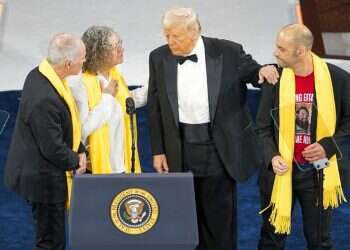U.S. President Donald Trump's decision on Dec. 6 to recognize Jerusalem as the capital of Israel and take steps to implement a law passed in October 1995 mandating that the U.S. relocate its embassy to Jerusalem is just one of a series of presidential decisions that characterize Trump's operating code.
Indeed, like his decisions to pull out of the Vienna agreement on Iran's nuclear program, withdraw from the Paris climate accords, and not sign the Trans-Pacific Partnership trade agreement, Trump's Jerusalem decision indicates that the White House is acting consistently. What we have before us is a president who works methodically and with determination to fulfill his commitments to voters, one after the other.
The 45th president has managed in under 16 months in office to acquire the reputation of a reliable leader who carries through on both his promises and his threats. But beyond being yet another concrete example of his determination to translate the main points of his worldview into tangible policies despite pressure from home and abroad, his decision to recognize Jerusalem and move the embassy there bears additional significance.
It's not just that Trump does not hesitate to question the convention – which dictated the thinking of Presidents Bill Clinton, George Bush Jr. and of course Barack Obama – that this is a move that would cause serious damage to the U.S.'s status in the region, it's that the decision stems directly from his belief system. The way he sees it, there is a fundamental similarity between the American people and the Israeli people in terms of their histories, national legacies, and founding ethos, ideology, and social structure.
This similarity, which forms the foundation of the special relations between the U.S. and Israel, made Israel – in the eyes of the president and much of the American people – an oasis of diligent initiative, progress, modernization and democracy amid the authoritative, traditional Arab world that is still mostly stuck in the past. Add Trump's ties (and that of his Evangelical supporters) to the Holy Land, the cradle of Christianity and the source of the holy scriptures that gave us the prophecies about the return of the Jewish people to their promised land.
These conditions of affection, empathy and identification are combined with a bunch of "hard" considerations relating to the protection and promotion of U.S. strategic interests in the Middle East. This is another level of solid presidential support for Israel, one that is rooted in Trump's view that the U.S.'s Israeli partner is a valuable defense asset for his administration.
Given the White House's goal of reducing direct U.S. military intervention in areas of conflict, while also deterring and punishing rogue terrorist states like Iran, Israel is seen as a strong, trustworthy ally with impressive intelligence and operational capabilities whose agenda – particularly when it comes to the battle against radical Islam, the core of which lies in Tehran – is an amazing fit for Trump.
So today we will experience Jerusalem's great day and the great day for the special relations between Israel and the U.S. that will mark the synthesis between the values and visions that illustrates the special nature of the Israeli-U.S. alliance.



